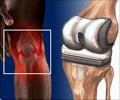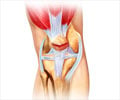New tools developed by Researchers at Duke University Medical Center analyzed knees and hips and found that osteoarthritic knee joints are consistently in a state of repair, while hip joints are not.

This suggests that knee and hip osteoarthritis may need different treatment approaches, Kraus said.
Perhaps the natural repair response would be sufficient to lead to a reversal or halting of the disease process in the knee if the joint breakdown could be halted, Kraus said.
"At least with the knee you've got an ongoing repair response that we didn't appreciate until now," Kraus said. "If you could capitalize on that and turn off the degradative (breakdown) processing you might have some good effects."
The findings, published in the Journal of Biological Chemistry on Friday, Feb. 10, suggest that for hips, however, turning off the degenerative process might not be enough. The hips would need a treatment to both turn off of the degenerative process as well as stimulate factors that could help to begin repair.
The knee is very accessible for injections, so it would make sense to inject the knee with agents that could turn off the degradative processes, and these could be delivered periodically with close monitoring, Kraus said. "That seems like a very viable strategy."
Advertisement
A cocktail of drugs might be needed for the hip, however, both to turn off the degradation and to stimulate the right type of reparative elements.
Advertisement
The findings about the knee were shocking to her, because the literature for years had compared the knee and ankle. Scientists knew the ankle was resistant to osteoarthritis, but the knee was very susceptible.
The thinking was that the ankle joint bones fit together well, like a ball in a socket, so the joint cartilage is less likely to degrade, while the knee joint bones fit less well together and require tissue, like the meniscus, to create a better fit – so knee cartilage is more likely to degrade.
"What we found is startling, because the hip joint also has a ball-in-socket structure yet it degrades and fails to mount a strong repair response," Kraus said. "We think this means that joint congruency alone cannot explain the difference in the repair response of joints, so there is more to learn."
Kraus and her team discovered a biomarker that is a measure of an altered (deaminated) protein, called D-COMP. In the circulation it signals hip degeneration and in cartilage it provides insight into the repair response of joint tissues. Kraus said this is the first biomarker specific to a particular joint site, and may be developed into a monitoring tool for hip-joint breakdown.
The next step is to understand the reasons for the difference between knees and hips and also to use the new tools to analyze the ankle for its level of repair response.
"Why is the ankle less susceptible than the knee to osteoarthritis?" Kraus asked. "Can we develop other tools to be specific indicators of joint health for other joints in the body?"
Source-Eurekalert









